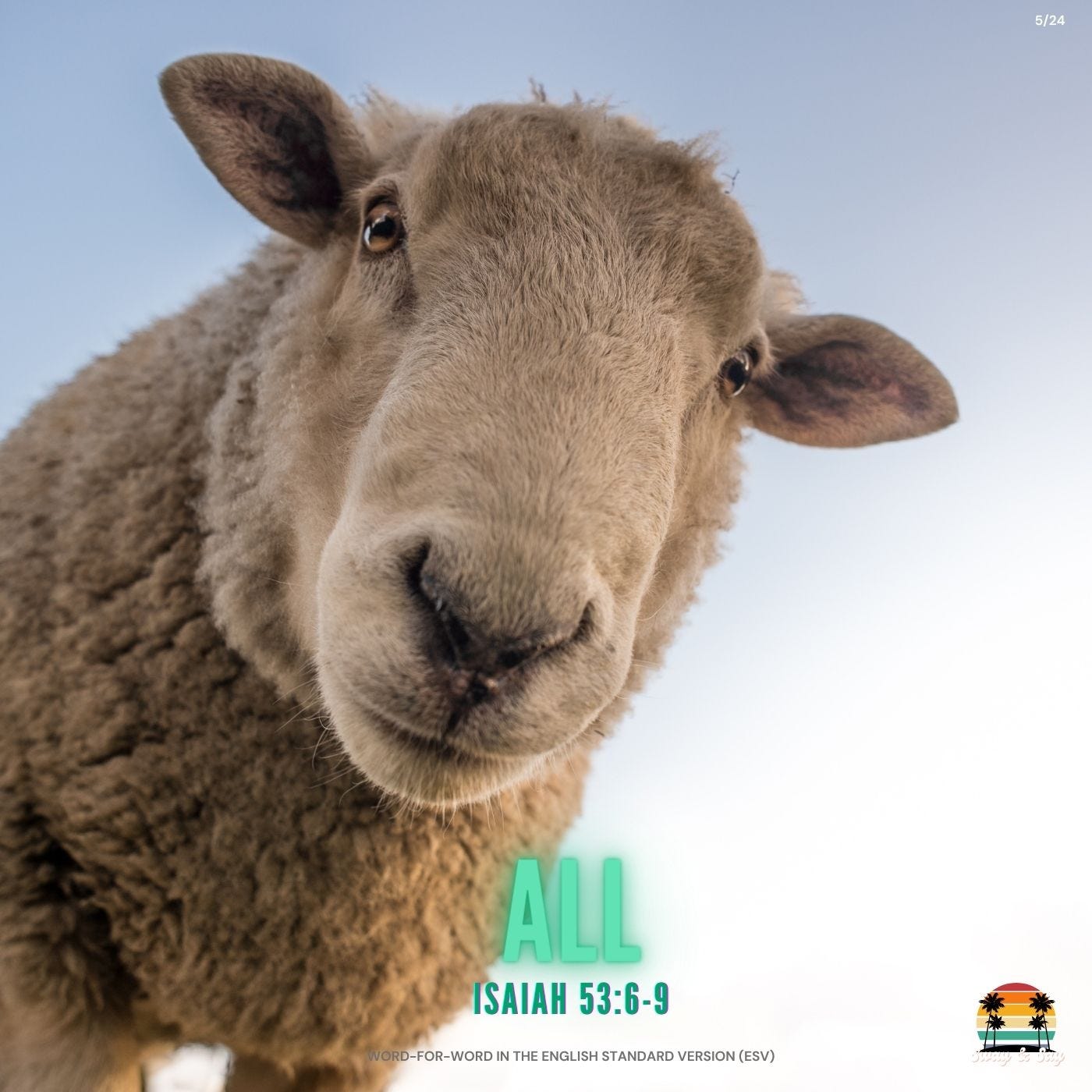Hey all,
Today we have the 5th song of 2024 and the 2nd in the Isaiah 53 series!
Verses 6-9.
It’s available on YouTube to watch and on Soundcloud to stream and download.
SoundCloud:
Isaiah 53:6-9
6 All we like sheep have gone astray;
we have turned—every one—to his own way;
and the Lord has laid on him
the iniquity of us all.
7 He was oppressed, and he was afflicted,
yet he opened not his mouth;
like a lamb that is led to the slaughter,
and like a sheep that before its shearers is silent,
so he opened not his mouth.
8 By oppression and judgment he was taken away;
and as for his generation, who considered
that he was cut off out of the land of the living,
stricken for the transgression of my people?
9 And they made his grave with the wicked
and with a rich man in his death,
although he had done no violence,
and there was no deceit in his mouth.
Today’s reflection: The Sins we don’t feel, hear or see.
God. I’m not like other people.
This quote blew my mind this week.
“A man may not be as other men, and yet he may not be as he should be.”
It comes from a sermon by Thomas Manton on verse 6 of Isaiah 53 (Isaiah 53: A Practical Exposition (eBook)):
6 All we like sheep have gone astray;
we have turned—every one—to his own way;
and the Lord has laid on him
the iniquity of us all.
He then went on to prove it, by sharing a portion of a parable Jesus told in Luke 18:9-14.
The parable of the Pharisee and the tax collector.
10 “Two men went up into the temple to pray, one a Pharisee and the other a tax collector. 11 The Pharisee, standing by himself, prayed thus: ‘God, I thank you that I am not like other men, extortioners, unjust, adulterers, or even like this tax collector. 12 I fast twice a week; I give tithes of all that I get.’ 13 But the tax collector, standing far off, would not even lift up his eyes to heaven, but beat his breast, saying, ‘God, be merciful to me, a sinner!’
Why did Jesus tell that parable?
Verse 9 tells us:
9 He…told this parable to some who trusted in themselves that they were righteous, and treated others with contempt:
Everything the Pharisee said was likely true, he didn’t sin like the tax collector, still, like the tax collector he was a sinner.
In summing up the parable, Jesus said: “14 I tell you, this man” - that is, the tax collector - “went down to his house justified, rather than the other. For everyone who exalts himself will be humbled, but the one who humbles himself will be exalted.”
Isn’t that striking? Jesus is saying, not only did the Pharisee miscalculate how God viewed the tax collector, he got the math wrong on how God saw him.
He didn’t even realize his own guilt. That he had gone astray, and that he had a lingering need for God’s forgiveness.
The sins we never hear about
When the bible says everyone, everywhere, in every age has gone astray from God, it can sound like a bit of an exaggeration to us.
Its as though there is a sin minimizing and disguising force in the world more powerful than any global marketing campaign.
For example, you can think we’re better than we are simply because no one ever confronts us with our faults or the truth about God.
As I mentioned I’m working my way through Psalm 119 in my daily meditations.
Yesterday morning, I meditated on verse 46, which says:
46 I will also speak of your testimonies before kings
and shall not be put to shame…
The Psalmist is describing something triumphant. He sees shame as a real possibility, as a sort of hazard in what he is doing, but from which he trusts he will be saved.
It’s something that he’ll only be able to do by God’s strength and because of God’s work in his life.
At the end of the meditation I started to think about how sad this is for kings.
Think about it.
That tells me that, apart from this Psalmist, people prefer not to talk about God’s testimonies before these kings.
People tell kings what kings want to hear.
People tell a king what they think will move him to grant their release from prison, spare them from death, waive their taxes or not invade their town.
A king then could go on for a long time and not hear of, or have to face his sins. Like David, after he committed adultery with Bathsheba and murdered her husband.
Like kings we too may have things in our lives that are wrong but which people don’t tell us because they are afraid.
C.S. Lewis has a great essay on this called, The Trouble with X. You can listen it hear:
The sins we never see
All of us have blindspots to sins in our lives.
1 Timothy 5:24 says in the NIV: “The sins of some are obvious, reaching the place of judgment ahead of them; the sins of others trail behind them.”
Psalm 19:12 (ESV) - Who can discern his errors? Declare me innocent from hidden faults.
It’s easy to see the blindspot situation when we think about people from the past.
We keep finding flaws in our heroes. Consider the theologian Jonathon Edwards who owned slaves.
That could have been a blindspot owing to the time in which he lived.
It could also be a blindspot due to where he lived: America.
The British preacher Charles Spurgeon said he almost ended up closing the school he had set up to train pastors after being cancelled by Americans who used to buy his sermons.
“The large sale of my sermons in America, together with my dear wife s economy, enabled me to spend from £600 to £800 a year in my own favourite work ; but, on a sudden, owing to my denunciations of the then existing slavery in the States, my entire resources from that " brook Cherith " were dried.” (The Autobiography of Charles Spurgeon, page 138)
While the practice is now outlawed, it didn’t become bad overnight. We’ve just now decided stealing a man from his country and shipping him across the world to work without pay until he dies, cannot b squared with anything the bible says about slavery.
As Manton preached that we learn most from those we know well, and thats the source of ‘national sins’.
Watch your step
I’ll leave you with 2 points from Manton:
First, realize what this verse is all about. The Lord Jesus Christ. It shows us that we have all sinned and need the forgiveness that comes through God laying our iniquity on him.
after we become Christians, we need to “Ponder the path of your feet,” and turn from sinning. (Prov 4:26)
The book, Isaiah 53: A Practical Exposition (eBook) can be downloaded for free at Monergism.com in EPUB, .MOBI & PDF FORMATS.














Share this post